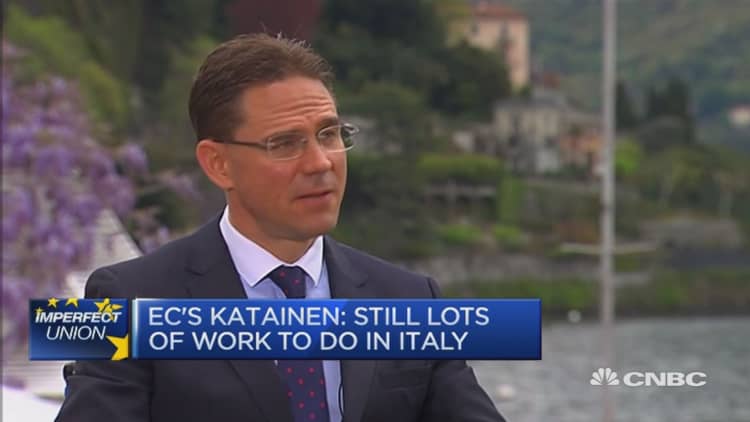Italy's leader says he's ready to put his premiership on the line. Prime Minister Matteo Renzi has pledged to step down if a proposed referendum fails to approve changes to the country's constitution that he says could finally stabilize Italian politics.
It will be one of the most concrete tests of public confidence for the 41-year old leader since he came to power via a party vote in February 2014, and comes on the heels of a 5 billion euro ($5.7 billion) fund to help quell concerns over non-performing loans held by some of the country's struggling banks.
CNBC takes a look at risks Renzi's administration is tackling.
The future of Italian banks
Concerns over financial instability have prompted the creation of a multibillion fund intended to prop up a banking sector struggling under the weight of nearly 360 billion euros ($409.75 billion) worth of non-performing loans (NPLs), according to Reuters figures.
A 5 billion euro ($5.7 billion) backstop fund for Italian banks will be financed by some of the country's lenders, asset management firms and banking foundations, including Unicredit and Intesa Sanpaolo, which are reportedly set to put up 1 billion euros each. The fund is expected to buy up unsold shares as well as bad loans.
But confidence in the program already appears shaky, with ratings agency Fitch warning on Wednesday that the country's largest lenders "face considerable contingency risks" given that the government is "continuously" calling upon the big banks to support state efforts to prop up "weaker banks and preserve financial stability."
"It will drag IntesaSP (San Paolo) and a number of other Italian banks into funding an investment which would normally fall outside their risk parametres," Fitch said in a statement, adding that big banks will see their financial profiles weaken and ratings come under pressure if they are asked to provide this kind of "extraordinary support."
Jack Allen, a European Economist at Capital Economics, told CNBC via email on Wednesday that the fund is just not big enough to mop up the mess.
"The 5 billion euro fund that has been proposed to purchase non-performing loans and buy the shares of distressed lenders looks very small. Indeed, the non-performing loans of Italian banks are worth well in excess of 300 billion euros," he wrote.
Allen also highlighted fears that the fund could be prohibited by the European authorities, through Economy Minister Pier Carlo Padoan insisted to Il Sole 24 Wednesday that he doesn't expect the European Central Bank or the European Union to put up a fight given the cash will come from private funders.
Even if that's the case, Allen says he expects the Italian economy to "remain sluggish, making it more difficult for banks to repair their balance sheets."
Political instability: Can Renzi hold on?
A referendum expected to be scheduled for this coming autumn will be one of the most direct tests of Renzi's near two-year time in office. If it fails, the young leader has promised to resign.
Renzi has already seen his approval rating nearly halve since 2014, but still remains the country's most popular political leader at 41 percent, according to a Demos poll published by La Repubblica in Italy.
The referendum will ask citizens to vote on reforms that will effectively replace the senate with officials and state-nominated members that will lose legislative veto rights. It's seen as a drastic change to a political system that currently balances power between the parliament and upper house. The idea behind the move is to put an end to short-term governments and instill political stability.
Some strings still remain loose, though, with high jobless rates and sluggish growth still weighing on the country's prospects. One in three Italians aged 25 and under are unemployed, compared to one in five across the whole of the EU, and 6.9 percent in Germany, according to EU statistics service Eurostat. Meanwhile, quarterly growth was tracked at a mere 0.1 percent during the last 3 months of 2015.

Regional complaints turned violent last Wednesday when the prime minister's visit to Naples was greeted with a 1,500 strong protest that saw some citizens throw rocks and fireworks at police roadblocks, Reuters reported. It comes on the back of industrial redevelopment plans that even the mayor has condemned for lacking consultation.
Despite it all, Wolfango Piccoli, Co-President of Teneo Intelligence says Renzi will easily win the referendum, in part thanks to the disarray of the opposition.
A victory will likely then pave the way for general elections in 2017, "depending on the state of the economy," Piccoli said -- a move which could give Italy's prime minister a conclusive mandate to check off a list of ambitious reforms that could spell drastic changes for Italy's political and economic landscape.


